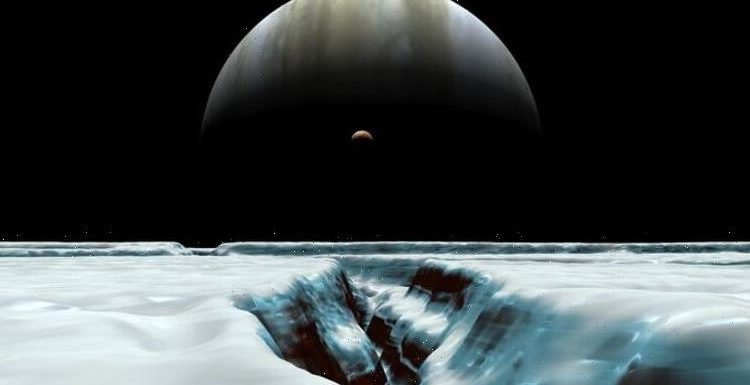
Jupiter's Ganymede moon can be heard from Juno spacecraft
We use your sign-up to provide content in ways you’ve consented to and to improve our understanding of you. This may include adverts from us and 3rd parties based on our understanding. You can unsubscribe at any time. More info
Scientists believe that the salt water found in the icy shell of Europa may carry oxygen, suggesting the possibility of life on Jupiter’s moon. A new study claims that the salt water in this shell could be transporting oxygen into an ice-covered ocean of liquid water.
A team of researchers from the University of Texas concluded that the salt water could potentially sustain alien life underneath Europa’s “chaos terrains”, which are landscapes that are comprised of cracks, ridges and ice blocks.
Chaos terrains are found on Mercury, Mars, Pluto and Europa, where the uneven landscape covers a quarter of the surface.
The study, published in the journal Geophysical Research Letters concluded: “Some icy moons in the outer solar system likely contain an ocean beneath their ice shells.
“Jupiter’s moon Europa may be especially suitable for life if radiolytic oxidants generated at its surface travel efficiently through the ice.


“We propose that oxidants can be transported through the ice by drainage of brines generated during the formation of chaotic terrains.
“These enigmatic surface features are thought to require the formation of large volumes of near-surface brine.”
The researchers believe that the amount of liquid water on Europa could match the quantity present underneath the ocean.
While this theory has been proposed before, the researchers were able to put it to the test by building the world’s first physics-based computer simulation of the process.

Lead researcher Marc Hesse, a professor at the UT Jackson School of Geosciences Department of Geological Sciences, said: “Our research puts this process into the realm of the possible.
“It provides a solution to what is considered one of the outstanding problems of the habitability of the Europa subsurface ocean.”
Scientists are very keen on studying Europa for the presence of alien life as the Moon has previously shown signs of oxygen and water, along with chemicals that are vital for sustaining life.
Dr Steven Vance, a researcher at NASA’s Jet Propulsion Laboratory said: “The highest estimate would make the oxygen levels in Europa’s ocean similar to those in Earth’s oceans — which raises hope about the potential for that oxygen to support life in the hidden sea.
DON’T MISS:
Solar storm warning: NASA predicts direct Earth hit from ‘fast’ impact [REVEAL]
Australia battles ‘major outbreak’ as two die from virus [SPOTLIGHT]
Flurona: Patients with Covid and flu at higher risk of death [REPORT]


“It’s enticing to think of some kind of aerobic organisms living just under the ice.”
“NASA’s upcoming 2024 Europa Clipper mission may help improve estimates for oxygen and other ingredients for life on the icy moon.”
Dr Kevin Hand, also from NASA’s Jet Propulsion Laboratory, said: “The study presents a compelling explanation for oxygen transport on Europa.
“We know that Europa has useful compounds like oxygen on its surface, but do those make it down into the ocean below, where life can use them?
“In this work, the answer seems to be yes.”
Source: Read Full Article